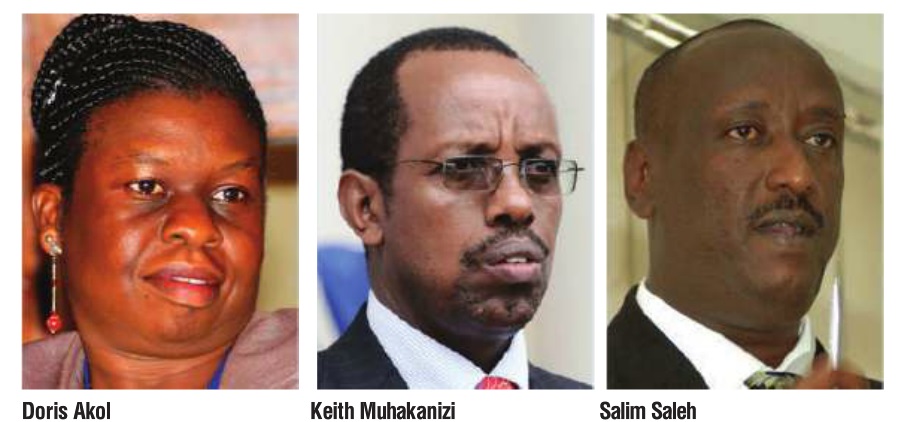Inside the Shs1 trillion rescue plan for loan stressed companies

On July 9, President Yoweri Museveni summoned top officials from the Ministry of Finance, the Central Bank and Uganda Revenue Authority (URA) for a meeting at State House, Entebbe. Amongst those who attended what has been described as a high stakes meeting was Deputy Central Bank Governor, Louis Kasekende, URA Commissioner General, Doris Akol. Others included officials from the Finance Ministry, and the head of Operation Wealth Creation, who is also President Museveni’s brother, Gen. Caleb Akandwanaho aka Salim Saleh. Up for discussion was what to do for over 100 Ugandan companies that are reeling under heavy commercial bank loans.
The meeting followed several others in which technocrats from the central bank and the Finance Ministry have sharply disagreed and opposed plans by some top politicians to have government fork about Shs1trillion from the public purse to pay off the loans owed to commercial banks and save private businesses, whose assets some banks have already started putting under receivership.
Details of this meeting remain scanty but The Independent understands that even before the President, the technocrats stood their ground, and opposed the proposed bailout package.
Meanwhile, even as the meeting raged, bailiffs, auctioneers, and debt collectors continued to do brisk business attaching assets of companies neck deep in debt. With the economy failing to pick up pace for the fifth year in a row, the trend appears likely to continue unless checked.

Financial analysts are saying the loan distressed businesses are the latest hint to the gravity of the situation the Ugandan economy is in.
“What we see manifesting is a bigger economic problem, the entire business community has been exposed to the strong economic headwinds,” Stephen Kaboyo, the former executive director operations at the central bank, who now runs the sovereign asset management fund Alpha Capital.
He added: “There is a terrible crisis of confidence, investors, financial institutions are all afraid that many firms are going to fail.”
Kaboyo told The Independent that the general lack of long term money in the economy is at the heart of the current crisis.
“Business firms borrow short term to finance medium term and long term projects,” Kaboyo said, “This mismatch makes it unsustainable and puts a lot of pressure on borrowers.”
This is even more critical because Uganda’s economy is mainly private sector driven, Kaboyo said.
“The private sector is the engine of growth and creator of wealth and employs more people than the public sector,” he said.
When big businesses, such as a large steel maker collapses, Kaboyo told The Independent, it leads to loss of jobs in direct layoffs and more indirectly through the supply and distribution value chains.
Kaboyo also said that the current conditions make a strong case for government intervention. He says that a one- off bailout for the private sector, if properly structured, would be a pragmatic approach to stabilise the economy.
“This may not necessarily be cash, it may be credit guarantees, may be administrative through working with financial institutions to restructure loan obligations,” Kaboyo said, “If it has to be a financial offering this could in form of debt or equity or a line of credit, or subsidies which has to be accompanied by greater oversight and monitoring to mitigate risks of moral hazard.”
Government’s plan
The government has been mulling over the situation described by Kaboyo. Several interventions have been suggested but the latest plan, which could see the government fork out close to Shs1 trillion (Approx.US$300 million) to save distressed big business, is attracting both praise and sharp criticism.
The Independent understands that the cash bailout is expected to come through an Asset Recovery Vehicle (ARC)like the Non Performance Assets Recovery Trust (NPART) that was established in 2006 to recoverclose to 100 billion shillings that had been borrowed from the former Uganda Commercial Bank (UCB) and Uganda Development Bank (UDB).
Initially, government had wanted to directly bail out the companies but under another proposed arrangement, government will place into the ARC monetary obligations of selected ailing private entities deemed “too big to fail” and resolve them with their lenders; mainly commercial banks. The managers of the ARC will then undertake to collect the debt from the private firms.
The other plan is for the loans to be sold-on to a recapitalised Uganda Development Bank in an arrangement that could see them shift from short-term liabilities payable in under 10 years to long-term liabilities which the ailing firms could pay over 20 years. Under this arrangement, the interest rates would also be renegotiated downwards.
The deal, if it goes through, will be the biggest deployment of taxpayers’ money to prop up ailing private companies in the history of Uganda. It will be bigger than even the Public Enterprises Reform and Divestiture of the 1990s and the earlier distribution of the properties of expelled Asian in the 1970s. It will also be unique in that it will most likely be executed in secret, without either a defined structure or an Act of parliament.
 The Independent Uganda: You get the Truth we Pay the Price
The Independent Uganda: You get the Truth we Pay the Price



Just another way of transferring public wealth to private pockets – in most cases, pockets that have contributed to the President’s campaign. All these private businesses operate in a free market, with rewards for taking sensible risk. When they make mega profits, they don’t donate a portion to the public, do they? Why then, should the public support them when they make losses? In most cases, these are bad investments, for which the entrepreneur (not the taxpayer) should pay the price! If a business has expanded so much that it has 70% idle capacity, that was bad planning by the owners. It’s laughable to suggest that a few firms going down will “collapse the economy”. If Uganda’s economy is such a flimsy house of cards, maybe it should be allowed to collapse. A bailout as proposed will create moral hazard, making it even more likely that future wealthy “businessmen” beneficiaries will take even more outrageous risks, and plunder their companies, in the knowledge that “Government” (i.e. the taxpayer) will come to their rescue anyway. A perfect example of private profit and socialised losses!
Well said
Govt wants to take one trillion out of the tax payers’ purse to bail out ailing companies. The same govt owes suppliers one trillion!?! It is most likely that the beneficiaries of the bail out are also the suppliers who haven’t been paid. So after bailing them out, does govt also intend to clear the arrears? Meanwhile, there are small businesses which are also sinking in “small debts” taken from micro-finance institutions, SACCOs and Village Loan Schemes, who is going to bail them out?
Proponents appear to be mainly the Who-is-Who in Uganda’s business
community and politicians, while opponents appear to be technocrats in
Ministry of Finance, policy makers, and regulators.
Mistakes by investors that are pushed by lack of strategic planning but by free wheeling opportunism should never be a burden on Ugandans. They invest without thought, no focus and majority of them have never had of business analysis in its raw form. They expand without planning and now that they are collapsing Ugandan should shoulder them!!!
Such intervention should be into the economy as a whole not to inefficient organizations that employ their cronies without regard to skill. We all borrow from the same institutions and have the same burdens. If a bank did not appraise her client well, should we prop it. The same bank will announce profits, shouldn’t it be left to leak their wounds like all of us.
For once the technocrats are spot on.
Yet to confirm but the same so called investors could be benefiting from other incentives that are denied us.
So where is our economy heading with this?. the worst in history than AMIN
If our government is serious, it should only think of
helping the affectecd companies by renegotiating the loans with commercial
banks or ask Uganda development Bank to buy out the
loans. Sincerely we are all sweating to meet our loan obligations and its quite
difficult for me to understand how they compiled that least of affected
companies. I have seen Ham also listed as a beneficiary and yet this is same
person who borrowed to build a 5 star residential home in Bunga, estimated to
be USD 5millions in addition to buying several flashy vehicles. Pls advise me
how the economy is going to benefit from that? Am not against ham but this is
just an example.
Secondly, there is nothing wrong with banks selling off
businesses because that’s what happens in the free world. This will not put our
economy at risk since other capitalized investors will be taking over and still
continue doing business in Uganda.
Some of these guys borrow money and start showing off, buy
their concubines new vehicles, fly their families abroad for holiday,s etc and
now they want to shift their problems to the ordinary tax payer. That’s what
makes me hate this government with passion. Is there any due diligence that was
done to confirm that borrowed money was used to stimulate the economy? AND its high time that the small individuals also
start subsidizing themselves by not paying URA Taxes since nobody thinks us.